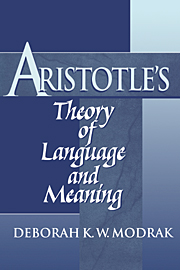1 - Meaning
Published online by Cambridge University Press: 16 November 2009
Summary
Aristotle grapples with the topic of meaning head-on in only one place – at the beginning of the De Interpretatione. As already noted, this text is, on the most charitable reading, compressed and elliptical.
Spoken words then are symbols of affections of the soul [τωv έv τη ψυχη παθημάτωv], and written words are symbols of spoken words. And just as written letters are not the same for all humans, neither are spoken words. But what these primarily are signs of [ώv μέvτоι ταvτα σημεια πρώτωv], the affections of the soul, are the same for all, as also are those things [πράγματα] of which our affections are likenesses [όμоιώματα]. (16a3–8)
Confronted with a summary statement of this sort, an interpreter must try to situate Aristotle's words in a broader context in order to understand their import. The Categories and the remainder of the De Interpretatione provide the context in which Aristotle's conception of significant terms will be explored in this chapter.
The problem of meaning as framed by Plato in the Cratylus will also be briefly discussed, because it sets the stage for Aristotle's account. Aristotle believes the relation between a phoneme and a meaning is conventional (16a20–29). The meaning is the intentional content of the psychological state for which the word stands. He holds, nevertheless, that the relevant mental states (meanings) are the same for all humans and are likenesses of extramental states of affairs. The crucial contrast here is between convention as the explanation of how sounds carry meaning and a natural relation, the same for all humans, rooted in the likeness between a meaning and a reality.
- Type
- Chapter
- Information
- Aristotle's Theory of Language and Meaning , pp. 13 - 51Publisher: Cambridge University PressPrint publication year: 2000



